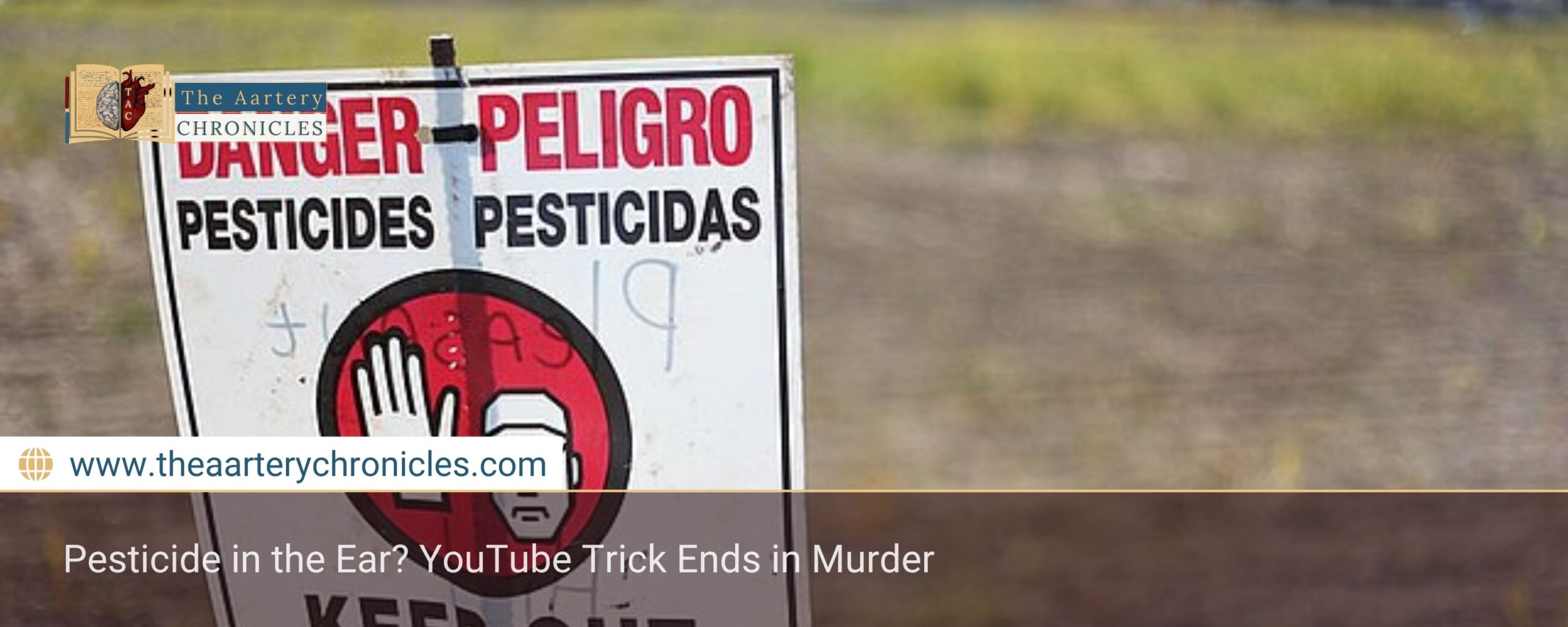

Pesticide in the Ear? YouTube Trick Ends in Murder
A shocking case from Telangana has drawn attention to the lethal consequences of misusing online content. In what is now being referred to as the YouTube tutorial pesticide murder, a woman, along with her lover and his friend, allegedly used pesticide as a weapon to kill her husband.
Domestic Abuse and Desperation
Sampath, a municipal sweeper in Karimnagar, Telangana, lived with his wife Ramadevi and their two children. Reports suggest that he regularly consumed alcohol and often fought with Ramadevi, creating a tense and abusive home environment.
Ramadevi, who ran a small snack business to support the family, became close to a customer, Karre Rajayya, a 50-year-old man. Their friendship turned into a romantic affair, and over time, they began plotting a way to remove Sampath from their lives.
How a YouTube Video Became a Murder Manual
According to police investigations, Ramadevi discovered a YouTube video that claimed pouring pesticide into the ear could cause instant death. Instead of questioning the source or safety of such information, she saw it as a potential method to kill her husband discreetly.
This chilling misuse of digital content is what has led authorities to call the case the YouTube tutorial pesticide murder.
Ramadevi shared the idea with Rajayya, who agreed to execute the plan with the help of his associate, Srinivas.
The Crime: Pesticide Used as a Lethal Weapon
On the night of the murder, Rajayya and Srinivas invited Sampath for drinks near the Bommakal flyover. Once he was heavily intoxicated and lying on the ground, Rajayya allegedly poured pesticide into his ear.
Sampath died at the spot, likely due to the toxic absorption through the ear canal, which is located dangerously close to the brain and central nervous system. Pesticide poisoning through such a route can lead to instant neurological shutdown or respiratory failure.
Cover-Up Attempts and Police Breakthrough
The next morning, Ramadevi acted as a grieving wife and filed a missing person complaint. However, both she and Rajayya strangely requested that no post-mortem be conducted when Sampath’s body was found. This unusual behaviour raised red flags.
Police began tracking their phone calls, movements, and CCTV footage. After collecting enough evidence, all three — Ramadevi, Rajayya, and Srinivas were interrogated. During questioning, they confessed to their roles in the murder.
They have since been arrested and placed under judicial custody.
Why This Method Was So Dangerous
This case emphasises the medical dangers of misusing toxic chemicals like pesticides, especially when used based on unverified online claims.
The ear is highly sensitive. Introducing chemical substances like pesticides into the ear can cause:
- Severe inner ear damage
- Nerve toxicity
- Seizures
- Respiratory arrest
- Immediate death due to neurotoxic effects
Medical experts warn that even a few drops of pesticide can cause irreversible harm if introduced into the body through non-oral pathways such as the ear, nose, or eyes.
Health Experts Urge Public Caution
The YouTube tutorial pesticide murder is not just a criminal case; it’s a public health alert.
Healthcare professionals are urging people not to act on unverified medical or chemical information from social media or video platforms. Misusing agricultural or industrial chemicals can be instantly fatal, even in small amounts.
Furthermore, platforms like YouTube must take greater responsibility to flag and remove dangerous content that promotes harmful practices.
Conclusion
This tragic case in Telangana serves as a harsh warning about the real-world effects of online misinformation. The YouTube tutorial pesticide murder demonstrates how easily accessible yet dangerously misleading content can turn deadly when misused.
Staying informed, asking medical professionals for guidance, and critically evaluating online sources can prevent such horrific outcomes in the future.
Source: Inputs from various media Sources
I’m a pharmacist with a strong background in health sciences. I hold a BSc from Delhi University and a pharmacy degree from PDM University. I write articles and daily health news while interviewing doctors to bring you the latest insights. In my free time, you’ll find me at the gym or lost in a sci-fi novel.
- Priya Bairagi
- Health News and Updates,People Forum
- 6 August 2025
- 20:00








